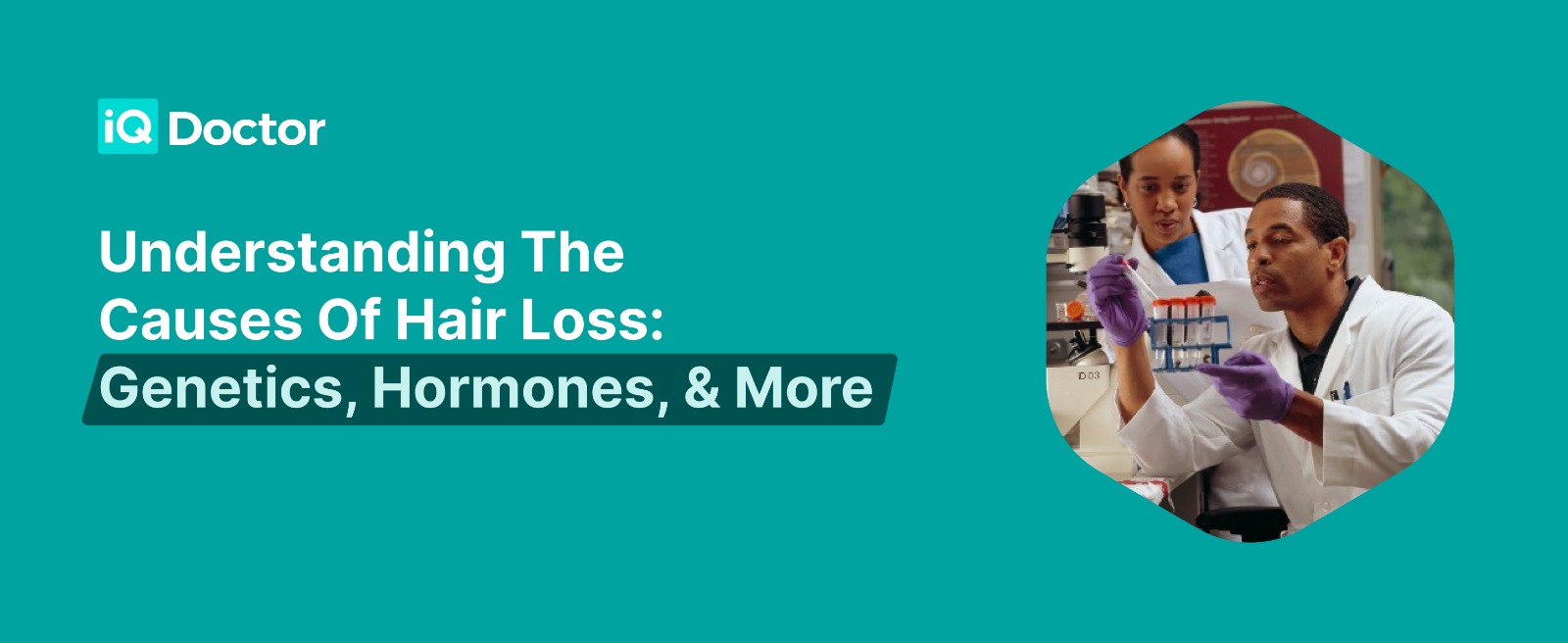Understanding the Causes of Hair Loss Genetics Hormones and More
20 July, 2023 | Holy Winter - Healthcare Writer

Hair loss is a common and distressing condition that affects
individuals of all genders and ages. Whether it's thinning hair, receding
hairlines, or bald patches, hair loss can have a significant impact on
self-esteem and quality of life. While it's often associated with aging, hair
loss can be caused by a variety of factors. In this comprehensive blog post, we
will delve into the primary causes of hair loss, including genetics, hormones,
medical conditions, and lifestyle factors, and explore effective solutions to
manage or prevent it. By understanding the underlying causes, you can take
proactive steps towards maintaining healthy hair and regaining your confidence.
I. Genetics
and Hair Loss
Genetics plays a substantial role in determining whether an
individual will experience hair loss. Androgenetic alopecia, commonly known as
male or female pattern baldness, is the most prevalent form of genetic hair
loss. This condition is hereditary and can be passed down from either side of
the family. The genetic predisposition causes hair follicles to become
sensitive to dihydrotestosterone (DHT), a hormone derived from testosterone.
Over time, the affected hair follicles shrink and produce thinner, shorter, and
less pigmented hair until they eventually stop producing hair altogether.
Understanding your family history of hair loss can provide valuable insights
into your own risk factors.
II. Hormonal Imbalances and Hair Loss
Hormonal
imbalances can have a significant impact on hair growth and contribute to hair
loss. One of the primary hormones involved is dihydrotestosterone (DHT), which
is a byproduct of testosterone. DHT can bind to hair follicles, causing them to
shrink and enter a resting phase, preventing healthy hair growth. Conditions
such as polycystic ovary syndrome (PCOS) in women and hormonal imbalances in
men can lead to excessive DHT production and subsequent hair loss. Furthermore,
fluctuations in estrogen and progesterone levels during pregnancy and menopause
can also trigger temporary hair loss. Consulting with a healthcare professional
or endocrinologist can help identify and address hormonal imbalances contributing to hair loss.
III. Medical Conditions and Hair Loss
Certain medical conditions can contribute to hair loss as a
secondary effect. Autoimmune diseases, such as alopecia areata, cause the
immune system to mistakenly attack the hair follicles, resulting in patchy hair
loss. Thyroid disorders, particularly hypothyroidism, and hyperthyroidism, can
disrupt the normal hair growth cycle. Nutritional deficiencies, such as iron,
zinc, and biotin deficiencies, can also lead to hair loss. Infections of the
scalp, such as ringworm, can cause temporary hair loss as well. Identifying and
addressing the underlying medical condition is crucial in managing hair loss
associated with these factors. Seeking medical advice and undergoing
appropriate tests will help determine the root cause of hair loss and guide
treatment options.
IV.
Lifestyle Factors and Hair Loss
Several lifestyle factors can contribute to hair loss.
Chronic stress is known to disrupt the normal hair growth cycle, leading to
excessive shedding. Smoking damages blood vessels, including those that deliver
nutrients and oxygen to the hair follicles, resulting in compromised hair
growth. Poor nutrition, including crash diets or restrictive eating patterns,
can lead to nutrient deficiencies that affect hair health. Over-styling,
excessive heat, and chemical treatments can cause physical damage to the hair
shaft, making it brittle and prone to breakage. Additionally, tight hairstyles
that pull on the hair, such as braids or ponytails, can contribute to traction
alopecia. Adopting stress-reducing techniques, quitting smoking, maintaining a
balanced diet rich in vitamins and minerals, using gentle hair care practices,
and avoiding excessive heat and chemical treatments can help minimize hair loss
caused by lifestyle factors.
V.
Effective Solutions for Hair Loss
Fortunately, there are various effective solutions available
to manage and address hair loss. Treatment options depend on the underlying
cause and may include:
Medications
MHRA-approved medications such as minoxidil and finasteride are commonly
used to treat hair loss. Minoxidil is a topical solution that promotes hair
growth, while finasteride helps block the conversion of testosterone to DHT.
Topical Treatments
Prescription-strength shampoos, conditioners, and serums containing active
ingredients like ketoconazole, salicylic acid, and saw palmetto can help reduce
inflammation, stimulate hair follicles, and promote healthier hair growth.
Hair Transplantation
Hair transplantation involves surgically moving hair follicles from areas with
abundant hair growth to areas with thinning or no hair. It provides a more
permanent solution for hair loss.
Low-Level Laser Therapy: Also known as red light therapy, it
involves the use of low-energy laser devices to stimulate hair growth and
improve the overall health of the hair follicles.
Lifestyle Modifications
Adopting a healthy lifestyle by managing stress levels, practicing regular
exercise, maintaining a well-balanced diet, and avoiding harmful habits like
smoking can have a positive impact on hair health.
Conclusion
Hair loss is a complex issue influenced by genetics,
hormones, medical conditions, and lifestyle factors. Understanding these causes
is crucial in developing effective strategies to manage or prevent hair loss.
If you are experiencing hair loss, it is recommended to consult with a
healthcare professional or a dermatologist specializing in hair disorders. They
can evaluate your specific situation, conduct necessary tests, and recommend
personalized treatment options. Remember, addressing hair loss requires
patience, as it may take time to notice improvements. Additionally, maintaining
a positive mindset and seeking support from loved ones can greatly help you
navigate the emotional impact of hair loss. By understanding the causes and seeking
appropriate care, you can take proactive steps towards maintaining healthy hair
and regaining your confidence.
Reviewed By

Omar El-Gohary
The superintendent and lead pharmacist - registration number 2059792.
Omar is passionate about developing healthcare technology to empower our patients.


